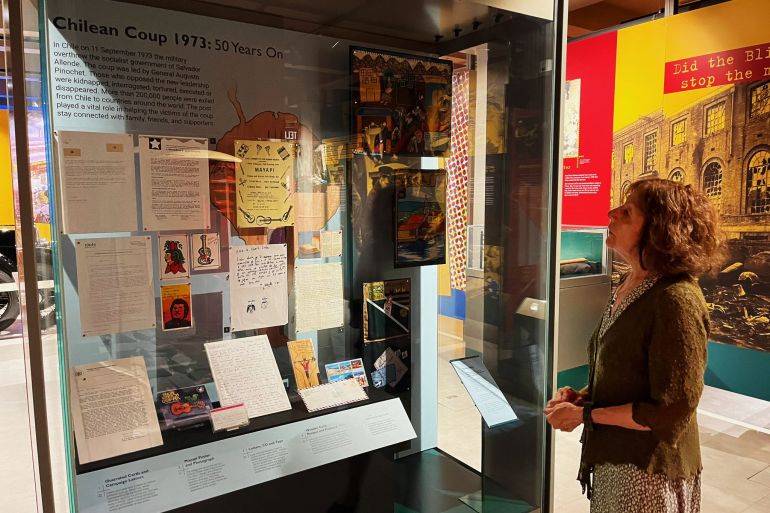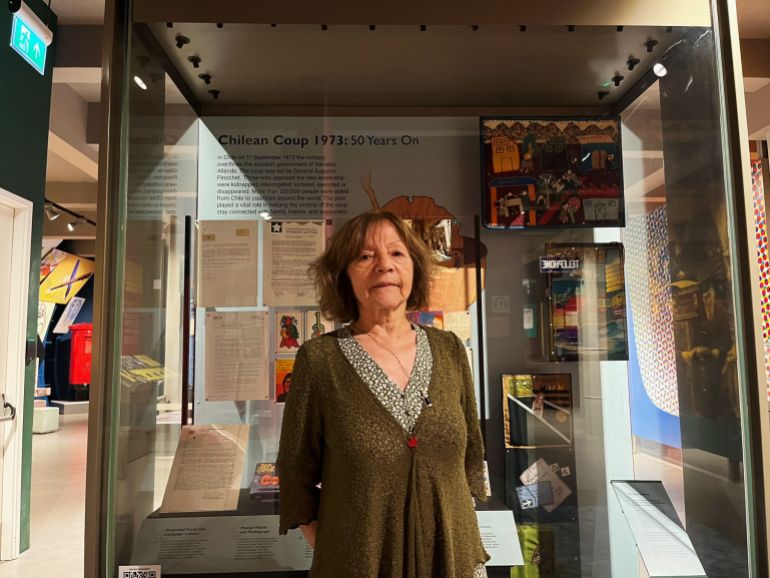Chile marks 50 years since Pinochet’s brutal coup
A half-century on, the country struggles with revisionism and denial as survivors continue their quest for justice.

London, UK and Santiago, Chile – Gloria Miqueles gazes at the window display at the Postal Museum in London. Some of her most personal items are on exhibition here: letters from her son’s estranged father in Chile, CDs and government petitions demanding justice.
Miqueles, 72, was exiled during the dictatorship of Augusto Pinochet, and has lived in the United Kingdom for 37 years. Together with a community of Chilean exiles, she prepared the exhibition to commemorate 50 years since Pinochet overthrew the socialist government of Salvador Allende on September 11, 1973.
Keep reading
list of 3 itemsChile: Pinochet’s Legacy
Chile’s justice minister: Pinochet-era wounds must remain visible
During the 17-year dictatorship, Pinochet’s secret police brutally persecuted, tortured and killed Allende’s supporters, forcing Chileans like Miqueles to flee.
“Commemorating the anniversary of the coup has become part of our collective construction of memory and demand for truth, justice and reparation,” she told Al Jazeera, citing a lack of reckoning in Chile for the crimes that occurred.
“There is an unprecedented extent of denialism and revisionism.”
In Chile, President Gabriel Boric has vowed to commemorate the coup with a robust programme of cultural events, museum openings and tree plantings in memory of each person killed. A left-wing, former student protest leader, Boric is viewed by many as the most progressive Chilean president since the country’s return to democracy.
“On September 11, we commemorate half a century of the coup d’etat that broke democracy in our country and that brought with it murder, death, torture, exile, banishment and so many other tragedies that we cannot forget,” Boric said during a public broadcast this past June.
The occasion is an opportune moment “for us to reaffirm that no differences between us will lead us to neglect and stop defending democracy and human rights”, he added.
Far-right protesters
Not all of Chile’s political sectors agree with Boric. His proposal to establish a cross-party agreement denouncing the dictatorship has been vehemently opposed by right-wing opposition parties.
Jorge Alessandri, a member of the chamber of deputies with the Independent Democratic Union party, which is closely associated with the Pinochet regime, recently said the coup was “justified” because the Allende government was “not respecting the rules of the constitution”.
His views are not isolated. A survey this year found that 36 percent of Chileans believe the coup was justifiable, while a separate public opinion poll found that four in 10 do not think Pinochet was a dictator.
Luisa Flores, 62, is among this group. “We didn’t have food before. Pinochet took control of the government, and things began to improve,” she told Al Jazeera during a recent anti-government demonstration outside the presidential palace.
She was joined by far-right protesters who waved flags decorated with the police emblem, calling for greater protections and power for Chilean police. Accusing Boric’s government of fuelling violent crime in the country, protesters said his commitment to human rights has significantly weakened law enforcement.
“If this is a democratic government, I prefer the Pinochet dictatorship,” one protester told Al Jazeera on condition of anonymity.
Many in Chile credit Pinochet’s rigid privatisation policies and free-market values for boosting the country’s economy and making it one of South America’s wealthier nations.
But Consuelo Contreras Largo, director of Chile’s National Human Rights Institute, believes such comments are deeply troubling, evidencing the persistent spread of misinformation.
“You still hear people condemn the violence of the dictatorship, but then defend the economic progress of the time,” she told Al Jazeera.
“To me, it’s not only inconceivable that someone would say something so brutal, but it’s also false. After the dictatorship, [around 40 percent of] Chileans were living below the poverty line.” In such circumstances, “you can’t talk about a successful country”.
‘We never deserved the brutality’
Pinochet held onto power until 1990, when a referendum forced him to give up the presidency – but he remained army chief until 1998, and then an unelected “senator for life”, a post he established during his time in office.
He was arrested in London in 1998 for crimes against humanity, but was allowed to return to Chile, where he died in 2006 with around 300 criminal charges still pending against him. He never spent a day in prison.
More than 3,000 people were killed during Pinochet’s dictatorship, while tens of thousands more were tortured or imprisoned.
Back in London, Miqueles looks somberly at the display she has curated to preserve the experiences of the exile community. “Nothing depresses me more” than hearing comments that downplay or justify the horrors of the dictatorship, she said.

“Yes, [the Allende government] made mistakes and lacked experience, but we never, never, deserved the brutality of the measures they took against us,” she said. “Did I deserve to be tortured and raped? I never carried a weapon. I just organised meetings with countryside workers.”
She was outraged to hear recent reports that a far-right deputy, Republican Gloria Naveillan, had dismissed the sexual crimes of the dictatorship as an “urban legend”, just weeks before the anniversary of the coup: “They are sticking their hand into our wounds and twisting it,” Miqueles said.
While she appreciates the symbolic importance of commemorating the 50-year date in Chile, she said the government’s gestures “don’t resolve anything”. Like many survivors of the bloody regime, she never received justice.
“For me personally,” she said, “justice is that those who imprisoned and tortured me are punished.”